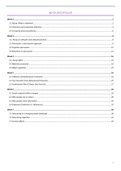Summary
Summary Marketing Communication Web clips + Comments 2023
- Course
- Institution
A summary of all the web clips of Marketing Communication, including comments and elaborations of the concepts. From the Marketing Communication class at Tilburg University, year
[Show more]



